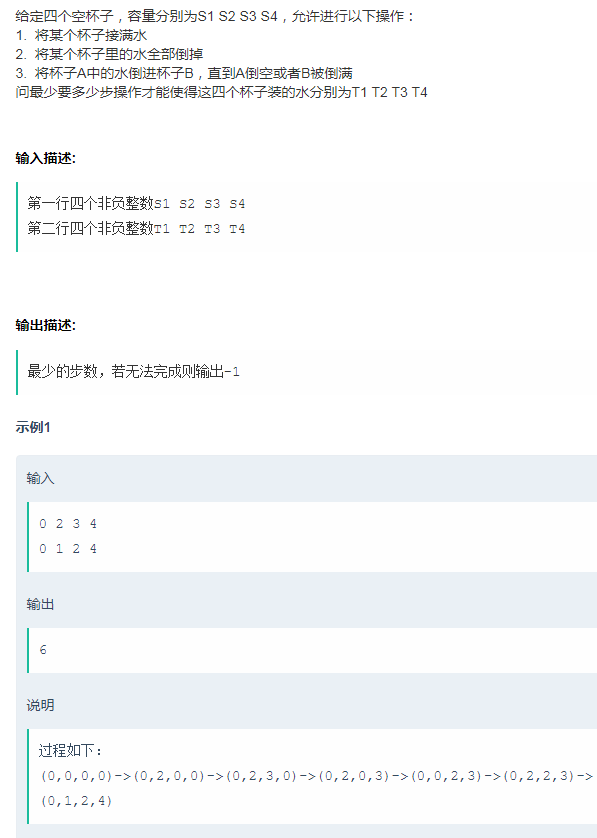
待学习。。
// Study.cpp: 定义控制台应用程序的入口点。 // #include "stdafx.h" #include<iostream> #include<cstdio> #include<cstring> #include<algorithm> #include<bitset> using namespace std; /*将4杯子倒水问题改为一个足够大的杯子倒向4个杯子*/ bitset<17043521> Hash;/*(大小为64*64^4+64*64^3+64*64^2+64*64^1+64*64^0)记录每次操作后的ABCD杯子的当前容量是否已经存在过*/ const int MAX_STEP = 100000; int WQ[MAX_STEP][6];/*记录每步操作后0和ABCD的当前容量,最后一个记录操作次数*/ int Goal[5];/*0和ABCD杯子最终状态*/ int Cap[5]; /*0和ABCD杯子的最大容量*/ int goalval; int head = 0; int tail = 0; void movw(int numfrom, int numto, int other1, int other2, int other3)/*numfrom倒入numto*/ { int total = WQ[head][numfrom] + WQ[head][numto];/*numfrom和numto的总量*/ WQ[tail][other1] = WQ[head][other1]; WQ[tail][other2] = WQ[head][other2]; WQ[tail][other3] = WQ[head][other3]; WQ[tail][5] = WQ[head][5] + 1; if (total>Cap[numto])/*总量和被倒入杯子的容量大小;大于numfrom就有剩余的,否则全部倒入numto*/ { WQ[tail][numfrom] = total - Cap[numto]; WQ[tail][numto] = Cap[numto]; } else { WQ[tail][numfrom] = 0; WQ[tail][numto] = total; } int hashval = WQ[tail][1] * 262144 + WQ[tail][2] * 4096 + WQ[tail][3] * 64 + WQ[tail][4];/*把ABCD杯子需要的状态抽象为一个值*/ if (hashval == goalval) throw WQ[head][5] + 1;/*判断是否为最终状态*/ if (!Hash[hashval])/*该次操作之后的状态之前未存在过并记录*/ { Hash[hashval] = true; if (++tail == MAX_STEP) tail = 0;/*超出最大操作数*/ } } int main() { Hash.reset(); scanf_s("%d %d %d %d", &Cap[1], &Cap[2], &Cap[3], &Cap[4]); scanf_s("%d %d %d %d", &Goal[1], &Goal[2], &Goal[3], &Goal[4]); head = 0; tail = 0; goalval = Goal[1] * 262144 + Goal[2] * 4096 + Goal[3] * 64 + Goal[4];/*把ABCD杯子需要的状态抽象为一个值*/ /*处理全部杯子中最后容量都为0的情况*/ if (Goal[1] == 0 && Goal[2] == 0 && Goal[3] == 0 && Goal[4] == 0) { printf("0"); return 0; } Cap[0] = 6400;/*0杯子为足够大的杯子,0杯子的容量*/ WQ[tail][0] = 6400;/*0杯子的当前容量*/ /*初始化ABCD杯子当前值为0*/ WQ[tail][1] = 0; WQ[tail][2] = 0; WQ[tail][3] = 0; WQ[tail][4] = 0; WQ[tail][5] = 0; ++tail; try { /*尝试每一种操作*/ while (head != tail) { /*A导入B,外层if判断A中当前容量不为零,内层判断B的最大容量不为0*/ if (WQ[head][0]) { if (Cap[1]) movw(0, 1, 2, 3, 4); if (Cap[2]) movw(0, 2, 1, 3, 4); if (Cap[3]) movw(0, 3, 1, 2, 4); if (Cap[4]) movw(0, 4, 1, 2, 3); } if (WQ[head][1]) { if (Cap[0]) movw(1, 0, 2, 3, 4); if (Cap[2]) movw(1, 2, 0, 3, 4); if (Cap[3]) movw(1, 3, 0, 2, 4); if (Cap[4]) movw(1, 4, 0, 2, 3); } if (WQ[head][2]) { if (Cap[0]) movw(2, 0, 1, 3, 4); if (Cap[1]) movw(2, 1, 0, 3, 4); if (Cap[3]) movw(2, 3, 0, 1, 4); if (Cap[4]) movw(2, 4, 0, 1, 3); } if (WQ[head][3]) { if (Cap[0]) movw(3, 0, 1, 2, 4); if (Cap[1]) movw(3, 1, 0, 2, 4); if (Cap[2]) movw(3, 2, 0, 1, 4); if (Cap[4]) movw(3, 4, 0, 1, 2); } if (WQ[head][4]) { if (Cap[0]) movw(4, 0, 1, 2, 3); if (Cap[1]) movw(4, 1, 0, 2, 3); if (Cap[2]) movw(4, 2, 0, 1, 3); if (Cap[3]) movw(4, 3, 0, 1, 2); } if (++head == MAX_STEP) { head = 0; } } printf("-1"); } catch (int step) { printf("%d ", step); } }
看了上面代码,自己给思路改进了一下,代码如下:
类似于图的广度优先遍历,每一种情况都一个个入队列,然后判断是否和预期的状态相等,相等时候停止循环,输出并返回。
// Study.cpp: 定义控制台应用程序的入口点。
//
#include "stdafx.h"
#include <iostream>
#include <vector>
#include <unordered_map>
#include <unordered_set>
#include <queue>
#include <string>
#include <algorithm>
using namespace std;
//存储每一种状态
bool m[64][64][64][64];
//int Step=0;
const int MaxStep = 10000;
vector<int> cap(4), goal(4);
class state {
public:
state(int ra=0,int rb=0, int rc = 0, int rd = 0,int s = 0):a(ra),b(rb),c(rc),d(rd),step(s){}
int a, b, c, d;
int step;
};
queue<state> Queue({ 0,0,0,0 });
//Queue.push({ 0,0,0,0 });
//对序号k进行操作,装满,或者导入其他容器
void water_solution(int t[5],int k)
{
int tmp = t[k];
int tmp2;
if (t[k] != cap[k] )
{
t[k] = cap[k];
if(!m[t[0]][t[1]][t[2]][t[3]])
{
Queue.push({ t[0],t[1],t[2],t[3], t[4] + 1 });
m[t[0]][t[1]][t[2]][t[3]] = 1;
}
t[k] = tmp;
}
//有剩余的水,可倒给其他杯子
if (t[k] != 0)
{
for (int i = 0; i < 4; i++)
{
//对自己倒水,可以全部倒走
if (k == i)
{
t[k] = 0;
if (!m[t[0]][t[1]][t[2]][t[3]])
{
Queue.push({ t[0],t[1],t[2],t[3], t[4] + 1 });
m[t[0]][t[1]][t[2]][t[3]] = 1;
}
t[k] = tmp;
continue;
}
//倒给别人,1:倒不完
if (t[k] + t[i] >= cap[i])
{
tmp2 = t[i];
t[i] = cap[i];
t[k] = t[k] - (cap[i] - tmp2);
if (!m[t[0]][t[1]][t[2]][t[3]])
{
Queue.push({ t[0],t[1],t[2],t[3], t[4] + 1 });
m[t[0]][t[1]][t[2]][t[3]] = 1;
}
t[k] = tmp;
t[i] = tmp2;
}
else
{
tmp2 = t[i];
t[i] += t[k];
t[k] = 0;
if (!m[t[0]][t[1]][t[2]][t[3]])
{
Queue.push({ t[0],t[1],t[2],t[3], t[4] + 1 });
m[t[0]][t[1]][t[2]][t[3]] = 1;
}
t[k] = tmp;
t[i] = tmp2;
}
}
}
}
int main()
{
for (int i = 0; i < 4; i++)
cin >> cap[i];
for (int i = 0; i < 4; i++)
cin >> goal[i];
int t[5];
state current{0,0,0,0};
int k = 0;
while (!Queue.empty())
{
current = Queue.front();
t[0] = current.a; t[1] = current.b; t[2] = current.c; t[3] = current.d; t[4] = current.step;
Queue.pop();
if (t[0] == goal[0] && t[1] == goal[1] && t[2] == goal[2] && t[3] == goal[3])
{
cout << t[4];
system("pause");
return 0;
}
for(int i=0;i<4;i++)
water_solution(t, i);
}
cout << -1;
system("pause");
return 0;
}